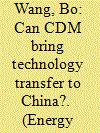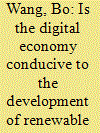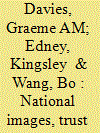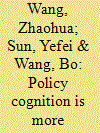|
|
|
Sort Order |
|
|
|
Items / Page
|
|
|
|
|
|
|
| Srl | Item |
| 1 |
ID:
094962


|
|
|
|
|
| Publication |
2010.
|
| Summary/Abstract |
China has undertaken the greatest number of projects and reported the largest emission reductions on the global clean development mechanism (CDM) market. As technology transfer (TT) was designed to play a key role for Annex II countries in achieving greenhouse gas emission reductions, this study examines various factors that have affected CDM and TT in China. The proportion of total income derived from the certified emissions reductions (CER) plays a key role in the project owners' decision to adopt foreign technology. Incompatibility of CDM procedures with Chinese domestic procedures, technology diffusion (TD) effects, Chinese government policy and the role of carbon traders and CDM project consultants all contribute to the different degrees and forms of TT. International carbon traders and CDM consultants could play a larger role in TT in China's CDM projects as investors and brokers in the future.
|
|
|
|
|
|
|
|
|
|
|
|
|
|
|
|
| 2 |
ID:
191199


|
|
|
|
|
| Summary/Abstract |
To achieve carbon neutrality targets, Asian countries have formulated renewable energy development strategies, among which digitalization has provided sufficient development impetus for the energy transition. By using the IV-GMM technique, this paper explores the impact of the digital economy on renewable energy generation (REG) in Asian countries from 2003 to 2019, and further investigates the moderating effect of financial development, political stability, and the rule of law. The results indicate that the digital economy has a positive effect on REG. Moreover, financial development, political stability, and the rule of law positively moderate the nexus between the digital economy and REG. In addition, compared to developing Asian countries, the promotion effect of the digital economy on REG is more significant in developed Asian countries. Finally, in terms of regional heterogeneity, the impacts of the digital economy on REG are only significantly positive in East and South Asian countries. Asian countries should actively develop digital industries, build a stable political environment, enhance financial services, and achieve low-carbon energy transition in the region.
|
|
|
|
|
|
|
|
|
|
|
|
|
|
|
|
| 3 |
ID:
178125


|
|
|
|
|
| Summary/Abstract |
This article uses a new dataset of Chinese student attitudes to foreign affairs to analyse how perceptions of the United States, Russia, Japan and North and South Korea affect respondent perceptions of international friendship with these states. Employing a mediation analysis we find that perceptions of national trustworthiness above all other images is the crucial factor in explaining cross-national friendship. These findings suggest that trust-building measures would be a fruitful avenue for both reducing the likelihood of conflict in the region and fostering cooperative international interactions.
|
|
|
|
|
|
|
|
|
|
|
|
|
|
|
|
| 4 |
ID:
176678


|
|
|
|
|
| Summary/Abstract |
As a demand response plan, the step tariff policy for electricity has been fully implemented for several years in China. However, it is not clear whether the step tariff policy for electricity is effective. Therefore, we analysed and compared the effectiveness of step tariff policy from two aspects: step tariff and policy cognition. Specifically, combining macro-scale statistical data and microscopic research data, we constructed a regression discontinuity design and binary response model. First, we tested the correction effect of the step tariff to residential electricity consumption behaviour. Further, combined with cognitive behavioural theory, we analysed the role of policy cognition in the occurrence of electricity saving behaviour. Finally, based on the cognitive evaluation theory, the impact of residents’ heterogeneity on their cognitive differences was identified. The specific conclusions are as follows: (1) The step tariff based on the Ramsay strategy cannot effectively correct electricity consumption behaviours as expected. (2) Compared with the step tariff, construction of correct policy cognition has a more significant effect on changing the customary behaviour of electricity consumption. (3) Policy cognition of residents is heterogeneous, and groups with weak policy cognition are accurately identified.
|
|
|
|
|
|
|
|
|
|
|
|
|
|
|
|
|
|
|
|
|